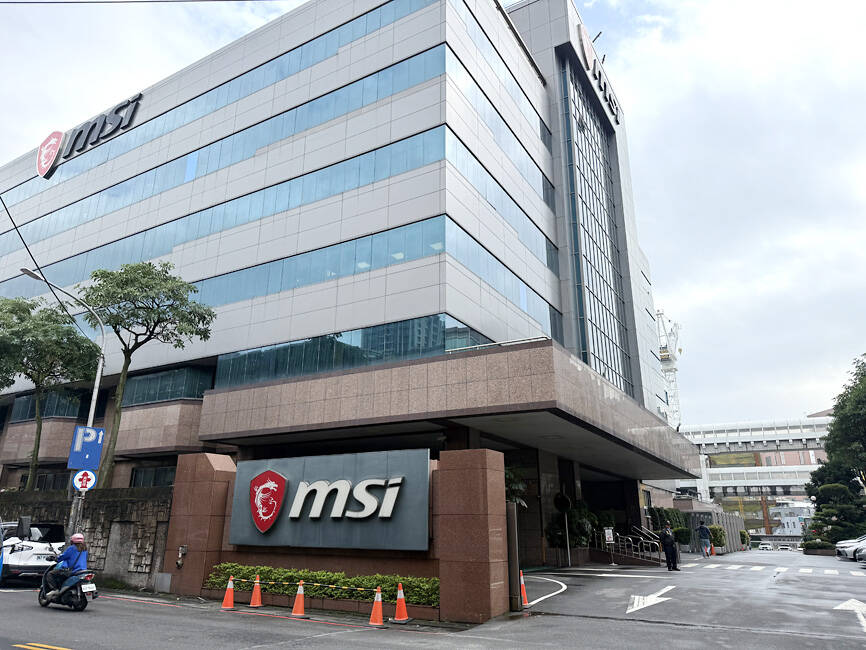Micro-Star International Co (MSI, 微星科技) plans to expand its production capacity in the US, with in-house server output at its US plant likely to exceed its earlier projection of 60 percent of total output.
The company in June said that it was targeting producing 60 percent of its US server output at its California facility and outsource the remaining 40 percent. The California plant is set to produce servers, PCs and gaming products.
However, the company might adjust the in-house production figure after Washington announced a 20 percent tariff on Taiwanese goods last week and pending the outcome of a Section 232 investigation under the US Trade Expansion Act of 1962, as clients might request higher capacity in the US, a source said yesterday, speaking on condition of anonymity.

Photo: CNA
While the company had planned to begin production at its California facility this quarter, the facility is still undergoing structural reinforcement and its operations might not be ready until the end of this year, the source said.
MSI manufactures motherboards, graphics cards, notebook computers, servers, optical storage and communications devices, with operations in Taiwan, China and the US.
The company plans to set up a warehousing unit for motherboards, graphics cards and notebooks in the Netherlands, set to start operations at the end of the year, the source said.
The company has been building a new plant in Taoyuan’s Gueishan District (龜山) since March, which is to add eight surface mount technology production lines in 2027, the source said.
The Europe, Middle East and Africa region accounted for 38 percent of MSI’s revenue last year, while North America made up 25 percent, company data showed.
The company might share tariff costs with clients such as Intel Corp, Advanced Micro Devices Inc and Nvidia Corp, as well as with consumers, to maintain its gross margin, but it is unlikely to pass the full tariff rate on to retail prices, as doing so could raise prices by 10 to 20 percent and dampen consumer demand, the source said.
MSI’s PCs and notebooks that use Nvidia’s RTX 50 series graphics cards entered mass production last quarter, but consumer demand for those products has exceeded supply, the source said.
The company has no plans to raise prices for existing models, despite potential tariff impacts, but would raise prices for future products equipped with newer generations of central processing units and graphics processing units, the source said.

On Tuesday, US President Donald Trump weighed in on a pressing national issue: The rebranding of a restaurant chain. Last week, Cracker Barrel, a Tennessee company whose nationwide locations lean heavily on a cozy, old-timey aesthetic — “rocking chairs on the porch, a warm fire in the hearth, peg games on the table” — announced it was updating its logo. Uncle Herschel, the man who once appeared next to the letters with a barrel, was gone. It sparked ire on the right, with Donald Trump Jr leading a charge against the rebranding: “WTF is wrong with Cracker Barrel?!” Later, Trump Sr weighed

SinoPac Financial Holdings Co (永豐金控) is weighing whether to add a life insurance business to its portfolio, but would tread cautiously after completing three acquisitions in quick succession, president Stanley Chu (朱士廷) said yesterday. “We are carefully considering whether life insurance should play a role in SinoPac’s business map,” Chu told reporters ahead of an earnings conference. “Our priority is to ensure the success of the deals we have already made, even though we are tracking some possible targets.” Local media have reported that Mercuries Life Insurance Co (三商美邦人壽), which is seeking buyers amid financial strains, has invited three financial

OUTLOOK: Among the six sub-indices, only the stock market confidence sub-index rose due to strong equity performance and expectations of a US Federal Reserve rate cut Consumer confidence weakened further this month, sliding to its lowest level in two-and-a-half years as households grew increasingly uneasy about the economic outlook, job security and big-ticket spending, a survey by the National Central University showed yesterday. The consumer confidence index fell 1.07 points from last month to 63.31, the weakest number since May 2023, said the university’s Research Center for Taiwan Economic Development (RCTED), which conducts the monthly poll. “Although the Directorate-General of Budget, Accounting and Statistics recently increased Taiwan’s GDP growth forecast for this year to 4.45 percent, consumer sentiment tells a different story,” RCTED director Dachrahn Wu

Artificial intelligence (AI) chip designer Cambricon Technologies Corp (寒武紀科技) plunged almost 9 percent after warning investors about a doubling in its share price over just a month, a record gain that helped fuel a US$1 trillion Chinese market rally. Cambricon triggered the selloff with a Thursday filing in which it dispelled talk about nonexistent products in the pipeline, reminded investors it labors under US sanctions, and stressed the difficulties of ascending the technology ladder. The Shanghai-listed company’s stock dived by the most since April in early yesterday trading, while the market stood largely unchanged. The litany of warnings underscores growing scrutiny of